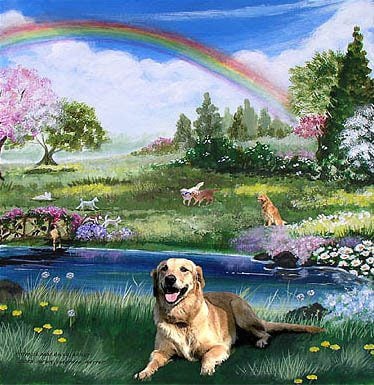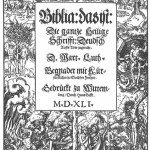
***
Jack Wintz, O.F.M., thinks so, and explains “why he believes the whole family of creation is included in God’s plan of salvation,” in his article, “Will I See My Little Doggy in Heaven?” (St. Anthony Messenger, July 2003). Here is my reply:
* * * * *
Animals have no eternal, immortal souls, as men do. They aren’t created in God’s image. They aren’t capable of sinning, and so are in no need of salvation, and didn’t participate in the fall (of man). But will they be in heaven?
Fr. John A. Hardon, S.J. (who received me into the Church), answered the question as follows:
Pets, as pets, do not go to Heaven. But animals and such like beings may be said to be brought to Heaven because, after the Last Day, they can serve as part of the joys of Heaven. In other words, animals and such like creatures may be said to be brought to Heaven to serve as part of our Heavenly joys. Clearly, we do not need pets to provide happiness in Heaven. But pets and such like creatures will be brought to Heaven to become part of our creaturely happiness in the Heavenly kingdom. Consequently, we may say that animals and such like creatures may be brought to Heaven by God to enable us to enjoy them as part of our creaturely happiness in Heavenly beatitude.
So our own particular pets may not be there as such, but animals likely will be, on the basis described above. An expert on EWTN (Dr. Richard Geraghty) replied similarly:
Now when any living thing dies, its soul is separated from its body. In the case of plants and animals the soul goes out of existence. But in the case of man, the soul remains in existence because it is a spiritual or immaterial thing. Consequently, it differs from the souls of animals in two important respects. First, it is the seat of intelligence or reason. For this reason a man is held responsible for his actions in a way that animals are not. . . .
In the light of this essential difference between human beings and animals, it would seem that we would not see the souls of our pets in heaven for the simple reason that they do not have immortal souls and are not responsible for their actions. They do not have the intelligence which allows them to choose either God’s will or their own will. There is, then, an incomparable distance, say, between the soul of the sorriest human being who ever lived and the most noble brute animal that ever walked the earth.
Now a child might be heartbroken at the thought that he will never see his pet again. He cannot yet understand this explanation about the difference between the human and the animal soul. I suppose that one could tell the child that when he hopefully gets to heaven, he could ask God to see his old pets if he still wished to. There would be no harm in that. For we know that when a person finally sees God, he will not be concerned with seeing old pets or favorite places but rather will be captured in the complete fulfillment of the joy of which old pets and favorite places are but little signs. We adults know that, even if the child does not.
For more information on how the Church sees animals in the lives of human beings, check the Catechism of the Catholic Church 2415-2418.
Bro. Ignatius Mary on AllExperts.com takes the same general position.
The article asks rhetorically: “does God’s plan of salvation include all creatures?”
The answer is “no” (at least if we mean, “in the same sense as with human beings”). A dog or a tree hasn’t rebelled against God. It may suffer adversity because of cosmic damage as a result of sin, or due to environmental irresponsibility, such as oil spills, disregard for erosion, or excessive pollution, etc., but is not itself morally culpable, and therefore cannot be saved. The Bible does talk about some sense of the redemption of all creation, but this clearly has a meaning other than “dogs need to repent and come to Jesus and the Church.” If this were true, every animal imaginable would be required to attend Mass, no?
God loves the animals, as far as that goes, just as we who are made in His image do (for the most part; Michael Vick might disagree). That poses no difficulty to Christian theology, but saying that animals are “saved” in the same way that people are (if indeed the article at the top is maintaining this; perhaps it is not) is seriously erroneous.
The three “experts” I cited above all said it was perfectly possible that there would be animals in heaven. It’s a question of what the Church has stated and what is permissible to speculate about, though we have no definite teaching. What we know for sure is that animals have no immortal souls. So it is not intrinsic to their nature that each and every animal has an eternal soul that will live forever. If our pets are in heaven, it’ll be because God chose to “recreate” them.
This is what we know for sure, based on Church teaching. I happen to think that there probably will be animals in heaven, based on the principle of analogy and God’s love. I would reason as follows:
1) Animals play an important role in human life.
2) Human beings have had a great deal of affection for animals all through history.
3) Heaven is far greater and unimaginable than the sum total of all of our aspirations and dreams and yearnings and hopes in this life.
4) God loves us and wishes us to be joyful and happy and fulfilled for eternity.
5) Since animals and pets have provided some of our happiness on earth, it is plausible to think that God would continue this aspect of life in heaven as well.
6) Sure, in heaven, all we would need is God, but that is also true on earth, in a sense. But since God gives us many (moral) pleasures on the earth that are distinct from He Himself (though all are derived from God and reflect back on Him), then we might posit that He would continue to do so in heaven as well.
Therefore, by analogy and plausibility, extrapolating from this life to the next, I contend (though I cannot know for sure) that the likelihood is that there will be animals in heaven. I highly doubt, however, that every animal that ever lived, let alone our pets, will be in heaven. Whatever animals are there will be by God’s choice and design, not because immortal souls are intrinsic to every animal, so that it is assured that each and every one is “saved” (a sort of “animal universalism”).
Catholic philosopher and apologist Peter Kreeft, in his book, Everything You Ever Wanted to Know About Heaven . . . But Never Dreamed of Asking (San Francisco: Ignatius Press, 1990, 45-46) takes an even more “affirmative” position:
10. Are There Animals in Heaven?
The simplest answer is: Why not? How irrational is the prejudice that would allow plants (green fields and flowers) but not animals into Heaven! [St. Thomas Aquinas, Summa Theologiae, III (Supplement), 91, 5] Much more reasonable is C.S. Lewis’ speculation that we will be “between the angels who are our elder brothers and the beasts who are our jesters, servants and playfellows” [That Hideous Strength, p. 378] Scripture seems to confirm this: “thy judgments are like the great deep; man and beast thou savest, O Lord” [Psalm 36:6]. Animals belong in the “new earth” [Revelation 21:1] as much as trees.
C.S. Lewis supposes that animals are saved “in” their masters, as part of their extended family [The Problem of Pain, pp. 138-39]. Only tamed animals would be saved in this way. It would seem more likely that wild animals are in Heaven too, since wildness, otherness, not-mine-ness, is a proper pleasure for us [C.S. Lewis, Miracles, p. 78]. The very fact that the seagull takes no notice of me when it utters its remote, lonely call is part of its glory.
Would the same animals be in Heaven as on earth? “Is my dead cat in Heaven?” Again, why not? God can raise up the very grass [Psalm 90:5-6. If we are “like grass”, and we are raised, grass can be raised, too]; why not cats? Though the blessed have better things to do than play with pets, the better does not exclude the lesser. We were meant from the beginning to have stewardship over the animals [Genesis 1:28]; we have not fulfilled that divine plan yet on earth; therefore it seems likely that the right relationship with animals will be part of Heaven: proper “petship”. And what better place to begin than with already petted pets?
St. Thomas Aquinas, in his treatment of the question, cited above by Peter Kreeft, concludes that neither plants nor animals are “renewed” in heaven after we are resurrected. Kreeft argues, on the other hand, that if plants are in heaven, why not animals, too? I had this thought, myself, when dwelling further on the analogical argument I made above, and before reading Kreeft just now.
The Catechism states:
1027 This mystery of blessed communion with God and all who are in Christ is beyond all understanding and description. Scripture speaks of it in images: life, light, peace, wedding feast, wine of the kingdom, the Father’s house, the heavenly Jerusalem, paradise: “no eye has seen, nor ear heard, nor the heart of man conceived, what God has prepared for those who love him.”
Generally, what goes beyond something we know in this life has some relation to this life, even if remote. The physical things that give us pleasure in this life will (I would contend) also likely be present in some sense in the next. If we have a feeling of awe in viewing a gorgeous mountain panorama or beautiful sunset or lovely cloud pattern with the sun streaming through (and Kreeft and others have constructed an “argument from longing” as one evidence that heaven and eternal life exist), then how is it implausible to think that heaven would likewise have “nature” in it?
After all, we’ll be physical creatures in our resurrected bodies. And the physical world we know, that we inhabit, is the world of nature and plants and animals and rocks and streams and oceans (sometimes very beautiful). By analogy, therefore, one can reason (as did Kreeft), that “if plants and trees are in heaven, why not also animals?”
Do we know that there is any such physical life in heaven, from Scripture? Yes. The heavenly city of Jerusalem, see by St. John in his visions had many kinds of jewels in it (Rev 21:15:21): jasper, gold, sapphire, agate, emerald, onyx, carnellian, chrysolite, beryl, topaz, chrysoprase, jacinth, and amethyst. These are all, of course, part of nature, and earthly elements. “Pearl” is mentioned in 21:21, and this is produced by a living creature (shelled mollusks, such as oysters or mussels). A pearl is constructed by these animals from nacre, or mother of pearl, which is itself partly organic.
We also know there are rivers, trees, and fruit:
Revelation 22:1-2 Then he showed me the river of the water of life, bright as crystal, flowing from the throne of God and of the Lamb through the middle of the street of the city; also, on either side of the river, the tree of life with its twelve kinds of fruit, yielding its fruit each month; and the leaves of the tree were for the healing of the nations.
To the extent that this is to be interpreted literally (it may be wholly or partly symbolic), we know that there is organic plant life in heaven, and so by analogy, why not also animals?, since trees and plants no more have an eternal soul than animals do, yet here they are in heaven, by God’s design.

















